Afghan peace talks: The woman who negotiated with the Taliban
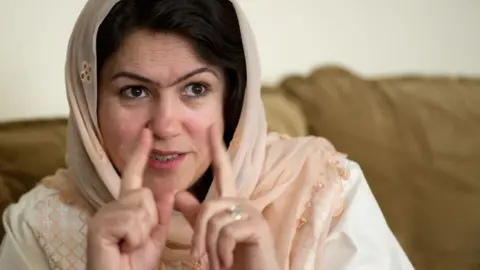 AFP/Getty images
AFP/Getty imagesFawzia Koofi's childhood dream of becoming a doctor was dashed when Taliban militants took over Afghanistan in the 1990s. The group, which banished women from public life, imprisoned her husband - and tried to kill her when she later became a politician.
But she ended up talking to the Taliban, who are now on the brink of a peace accord with US forces that drove them from power.
"I was not intimidated. For me it is important to be firm. I was representing the women of Afghanistan," she told the BBC.
'Some Taliban were looking at me'
Ms Koofi was one of the few women who were part of a pan-Afghan delegation that held many rounds of dialogue with the country's hardline Islamist former rulers, alongside the months of peace talks the US held.
This time last year, she and another woman, human rights campaigner Laila Jafari, entered a Moscow hotel room packed with 70 men.
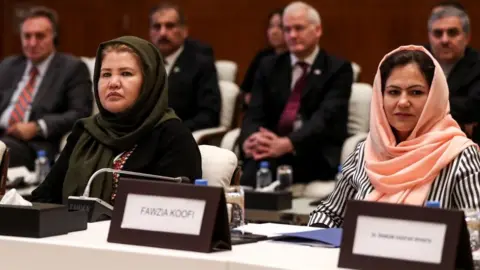 Getty Images
Getty ImagesOn one side of the room were the Taliban. On the other, the two women took their seats among Afghan politicians and activists, all of them men.
"I told them that Afghanistan was now represented by diverse views and the country was not bound by one ideology," she said.
"Some members of the Taliban delegation were looking at me. A few were taking notes. Some others were just looking elsewhere."
During the long talks process, the Taliban have refused to engage directly with the Afghan government, saying they don't recognise a "puppet government".
But after sustained pressure from the US and Russia, a compromise was struck and the group agreed to talk to an unofficial Afghan delegation.
Ms Koofi was part of that team on three occasions.
As someone whose life was dramatically altered by the Taliban, she confronted them directly about women's rights, saying more women should be included in the peace process.
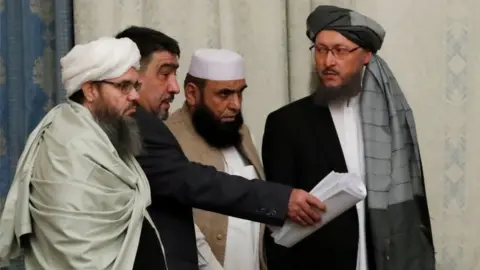 Reuters
Reuters"Since our side had women delegates, I suggested to them [the Taliban] that they should also bring women to the table. They laughed immediately."
During their rule from 1996-2001, the Taliban barred women from education and employment and imposed their own austere version of Islamic laws, including stoning to death and flogging.
Having lived all her life in Afghanistan, Fawzia Koofi knew people who had endured such punishments.
When it was their turn to speak, a Taliban negotiator responded to her demands for sexual equality.
"They said a woman can become prime minister but not president. They also said women can't be judges.
"I didn't agree with that but I didn't argue," Ms Koofi says. The format of the talks did not permit a two-way discussion.
The official Taliban line these days is that women can work and be educated - but only "within the boundaries of Islamic law and Afghan culture".
For people like Ms Koofi this is the crux of the problem. Islam has one holy book, but many streams of theological thought.
"I have heard differing views about Islamic teaching from different scholars. The Taliban follow extreme interpretations of the Koran."
'I never purchased a burka'
Fawzia Koofi first saw a Taliban fighter in September 1996.
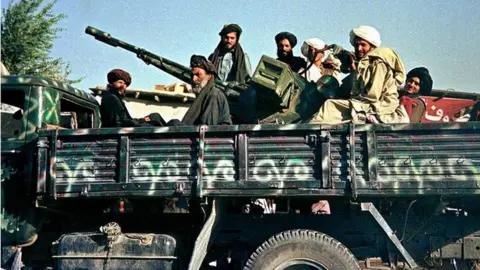 AFP
AFP"I was studying medicine in Kabul when the Taliban took over the city. I saw them from my fifth floor flat. There was fighting in the street below with militants holding automatic rifles."
Within days her childhood ambition had been destroyed and she was shown the door by the medical college, which was following orders from the militants. She stayed in Kabul and taught English to girls who had been thrown out of school.
"It was a very depressing period. If someone wants to undermine you and stop opportunities for you… it was very painful."
The Taliban issued a decree ordering women to wear the full-body burka in public.
"I never purchased a burka because I won't spend money on something which I don't consider to be part of our culture," she said.
Defiance came at a personal cost. She had to restrict her movements to stay safe.
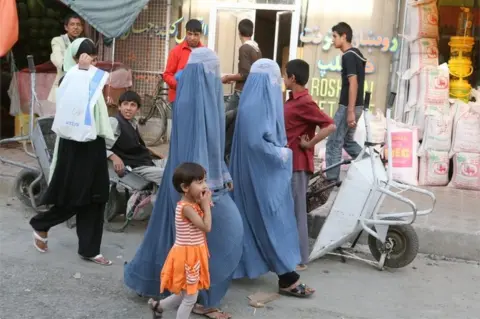
"The [Taliban's so-called] vice and virtue department used to patrol the streets and they used to beat up women if they didn't wear a burka."
Not surprisingly, most people felt a sense of relief when the Taliban were ousted after the US-led invasion following the 9/11 attacks in the US.
"We could walk in the streets and do our shopping without fear of being beaten up by the Taliban."
'My convoy came under fire'
After the Taliban fell, Ms Koofi worked for the United Nations, rehabilitating former child soldiers.
She was also left with two daughters to bring up on her own after her husband died of tuberculosis, contracted during his time in prison.
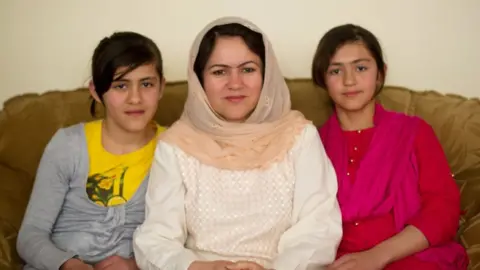 AFP/Getty images
AFP/Getty images But despite this, when parliamentary elections were announced in 2005, she decided to enter the fray. Her father had been an MP and she admits his support base helped her win votes.
"But the important challenge for me was to create a separate identity."
She went on to become deputy speaker of parliament in the first of her two terms as an MP. It was during this time she escaped a Taliban attempt to kill her in the south of the country.
"In March 2010 I went to Nangarhar to celebrate International Woman's Day. On my way back my convoy came under fire."
Bullets were fired from across the river and from a mountain top. Ms Koofi and her two daughters were saved by her security officers, who drove them into a mountain tunnel, from where they were airlifted to Kabul by helicopter.
'Everyone wants to have peace'
Ten years on and the Taliban and the US are inching towards a peace accord, which could be signed this weekend. It took only a few years for the militants to regroup and fight back - they now control more territory than at any time since 2001.
The human toll from the fighting has been immense - tens of thousands of civilians have been killed and injured and Afghanistan remains one of the poorest countries in the world. Some 2.5 million Afghans are registered as refugees abroad and another two million are displaced within their country. An estimated two million widows are struggling to make a living.
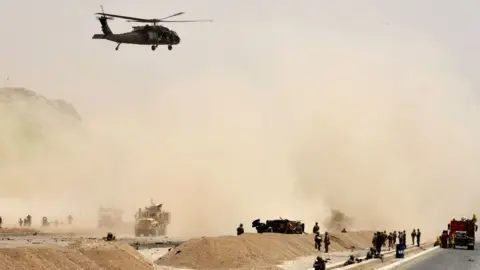 Getty Images
Getty Images"Everyone wants to have peace. We were born during war and grew up in war. Neither my generation nor my children know what peace means," says Ms Koofi.
But not a deal at any cost.
"Peace means the ability to live with dignity, justice and freedom. There is no alternative to democracy."
Whether the Taliban agree remains to be seen - how much they have changed is unclear. Their spokesman, Suhail Shaheen, told the BBC "people who are against peace are using woman's rights to derail the talks".
But Fawzia Koofi says: "Women have lost so much. How much more can we lose?"
Both her daughters are enrolled in Kabul universities and have grown used to life with access to media and the internet.
"No force can confine my daughters and other girls of their age to their homes. Anyone who wants to rule the country has to take that into account."

